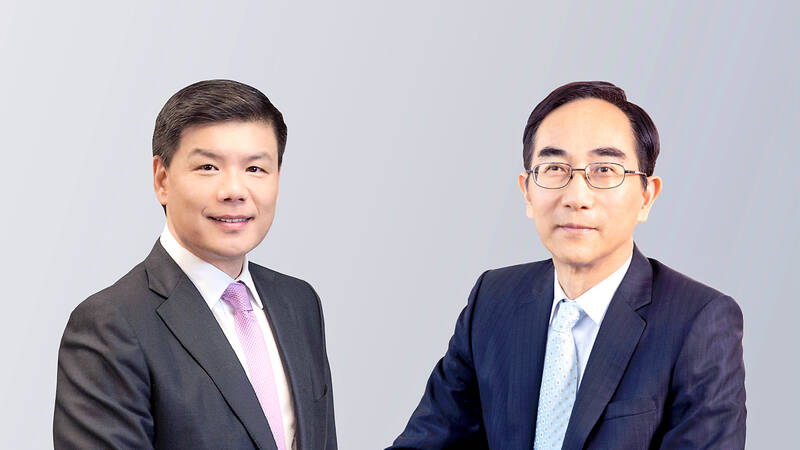China Development Financial Holding Corporation (hereinafter referred to as “CDF”) launched a high-level management team reshuffle. Today (26th), the Board of Directors approved Alan Wang to succeed as the Chairman and Paul Yang to take over as President & CEO. At the same time, CDF has appointed the positions of Chairman and President for its subsidiaries: Alan Wang will also serve as Chairman of KGI Life Insurance, Yu-ling Kuo will serve as President of KGI Life Insurance, and Paul Yang will serve as Chairman of KGI Bank. The new management team officially take office and will lead CDF to a new milestone.
CDF stated that under the leadership of Chairman, Alan Wang and President & CEO, Paul Yang, the new management team will fully utilize group resources, maximize business synergies, promote the growth of KGI Bank’s assets and distributions; build business and investment profitability growth momentum for KGI Life Insurance to respond to changes in the market environment; strengthen the development of KGI Securities’ wealth management and overseas business; deepen cooperation between CDIB Capital Group and Taiwan’s high-tech companies, and develop private equity products suitable for Taiwan’s wealth management market; improve the overall financial performance of CDF and maintain a consistently stable dividend policy.
Alan Wang and Yu-ling Kuo have a wealth of experiences in the insurance industry. As the insurance industry is about to align with IFRS17 and ICS, KGI Life has also recruited Winston Yung and Andy Lin to serve as Senior Executive Vice Presidents. Winston Rung has served as a director of McKinsey & Company (Hong Kong) and as CEO of the Hong Kong region, where he has successfully helped KGI Life in developing business distributions and digital transformation with remarkable achievement. He has rich experiences in insurance industry; Andy Lin, who has served as the CFO of CDF and KGI Bank, is well-versed in financial management affairs and has comprehensive experience within the group. In the future, they will assist KGI Life in smoothly integrating and maximizing synergies at the areas of business distribution, organizational momentum and financial management.

Photo courtesy of CDF
Paul Yang, CDF President & CEO and KGI Bank Chairman, has extensive experience in financial management, investment and M&A. In the past, during his tenure at CDF, he successfully transformed China Development Industrial Bank into a regional asset management firm and expanded CDF’s business roadmap in commercial banking and securities business through M&A. In the future, he will make good use of the advantages of the group and develop a balance approach in the three major pillars of personal banking, corporate banking and financial markets to steadily expand the scale of various businesses.
Steve Bertamini, the former President & CEO of CDF, vigorously promoted the company’s transformation during his tenure, introduced many advanced foreign systems to enhance employee engagement and NPS, and his achievements are outstanding. He will continue to serve as a Board of director at CDF. In addition, CDIB appointed David Chou as Vice Chairman at the beginning of the year. David Chou has served as Managing Director, Asia Investment Director and Global Partner of Goldman Sachs, and has more than 25 years of experience in the international financial market, providing M&A advisory services for American industrial, high-tech and manufacturing transactions.
CDF stated that through the high-level management reshuffle, CDF’s new management team will lead the group to open up a new pattern of innovation and become a leading financial institution in Asia.

Intel Corp chief executive officer Lip-Bu Tan (陳立武) is expected to meet with Taiwanese suppliers next month in conjunction with the opening of the Computex Taipei trade show, supply chain sources said on Monday. The visit, the first for Tan to Taiwan since assuming his new post last month, would be aimed at enhancing Intel’s ties with suppliers in Taiwan as he attempts to help turn around the struggling US chipmaker, the sources said. Tan is to hold a banquet to celebrate Intel’s 40-year presence in Taiwan before Computex opens on May 20 and invite dozens of Taiwanese suppliers to exchange views

Application-specific integrated circuit designer Faraday Technology Corp (智原) yesterday said that although revenue this quarter would decline 30 percent from last quarter, it retained its full-year forecast of revenue growth of 100 percent. The company attributed the quarterly drop to a slowdown in customers’ production of chips using Faraday’s advanced packaging technology. The company is still confident about its revenue growth this year, given its strong “design-win” — or the projects it won to help customers design their chips, Faraday president Steve Wang (王國雍) told an online earnings conference. “The design-win this year is better than we expected. We believe we will win

Chizuko Kimura has become the first female sushi chef in the world to win a Michelin star, fulfilling a promise she made to her dying husband to continue his legacy. The 54-year-old Japanese chef regained the Michelin star her late husband, Shunei Kimura, won three years ago for their Sushi Shunei restaurant in Paris. For Shunei Kimura, the star was a dream come true. However, the joy was short-lived. He died from cancer just three months later in June 2022. He was 65. The following year, the restaurant in the heart of Montmartre lost its star rating. Chizuko Kimura insisted that the new star is still down

While China’s leaders use their economic and political might to fight US President Donald Trump’s trade war “to the end,” its army of social media soldiers are embarking on a more humorous campaign online. Trump’s tariff blitz has seen Washington and Beijing impose eye-watering duties on imports from the other, fanning a standoff between the economic superpowers that has sparked global recession fears and sent markets into a tailspin. Trump says his policy is a response to years of being “ripped off” by other countries and aims to bring manufacturing to the US, forcing companies to employ US workers. However, China’s online warriors